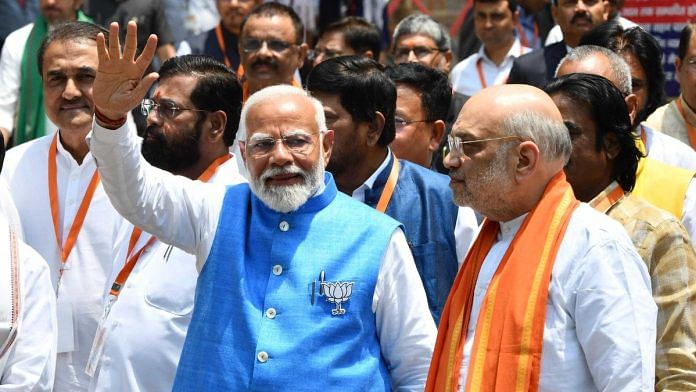India is deep in the throes of an intense general election, with Prime Minister Narendra Modi seeking a third term. A victory would put him in the same league as the country’s first Prime Minister Jawaharlal Nehru — the only to have been re-elected twice in a row.
But the India of 2024 is distinctly dissimilar from that of 1947. And what Modi represents is crucial to demonstrating that contrast.
Born to an OBC (Other Backward Class) family in what is now the western state of Gujarat, he made his way to the country’s highest elected office and has arguably emerged as the most dominant political figure in India since former Prime Minister Indira Gandhi.
Part of Modi’s appeal is his unabashed sense of ‘Hindu pride’, which he deploys to cultivate support among the ‘majority’ — Hindus, who constituted 79.8 per cent of India’s population as of 2022.
It was Modi who assiduously brought to the fore resentment simmering among the ‘majority’. At the heart of this resentment was a realisation that being a ‘majority’ does not automatically confer power.
For instance, most colonial “subjects” in Africa and Asia, like Hindus in pre-Independence India and ‘coloureds’ in South Africa during the Apartheid were an oppressed majority.
In India’s case, nearly 500 years of foreign rule had conditioned Hindus to accept subjugation as a path to peace in daily life. A rebellion against this conditioning culminated in the rise of the Bharatiya Janata Party (BJP) and of Modi, its current leader.
Since his days as chief minister of Gujarat in the early 2000s, Modi has made no bones about the fact that he sees himself as a vehicle for the subdued aspirations of the ‘majority’. According to him, he is enabling a re-awakening of ‘Hindu pride’ by bringing to the forefront cultural values and religious sensibilities that had long been muffled.
Also read: RSS-BJP separation is official now. It’s been a long time coming under Modi decade
The reason he is now so mysteriously powerful is that his supporters see him as someone who is somehow empowering the “peaceful majority” to demand what is rightfully theirs — recognition of and respect for their beliefs and a say in matters of policy.
By taking part in events of religious significance such as the ‘pran pratishtha’ (consecration) of an idol of Ram at the newly-built temple in Ayodhya, the Indian Prime Minister sent a clear message to both his supporters and critics — that, unlike many other political leaders, he was not afraid to wear his religious beliefs on his sleeve.
One can also not emphasise enough that Modi represents a much deeper struggle for freedom from oppression.
When colonial rulers vacated the colonies they had lorded over for decades at end, they left powerful rent-seeking nation-states to continue to “control” black and brown subjects. The design of the “State” they devised is the reason India and many other former colonies have an overwhelmingly powerful bureaucracy.
These relatively younger democracies have been in direct opposition to an overbearing “State”, and the fight is far from over. It is this fight between the governed and the nature of governance that Modi, who rose through the ranks from among the masses, represents.
Since assuming office in 2014, he has on numerous occasions voiced the need to rid Indians of the ‘colonial mindset’ that persisted through the ‘licence raj’ decades marked by a snail’s pace of growth.
As Modi himself put it in his Independence Day speech in 2018, “We don’t want the path of confrontation. We don’t want roadblocks. We don’t want to bow our heads before anyone. The nation will never stop, never bow, never get tired. We have to scale new heights.”
These reasons are perhaps why India’s ongoing parliamentary elections will go down in history, regardless of the outcome.
Asha Jadeja is a Silicon Valley-based entrepreneur, venture capitalist, philanthropist and a ‘change agent’. She tweets @ashajadeja325. Views are personal.




Only Hindus suffered 500 hundred years of oppression before independence ? This is Hindutva history!!